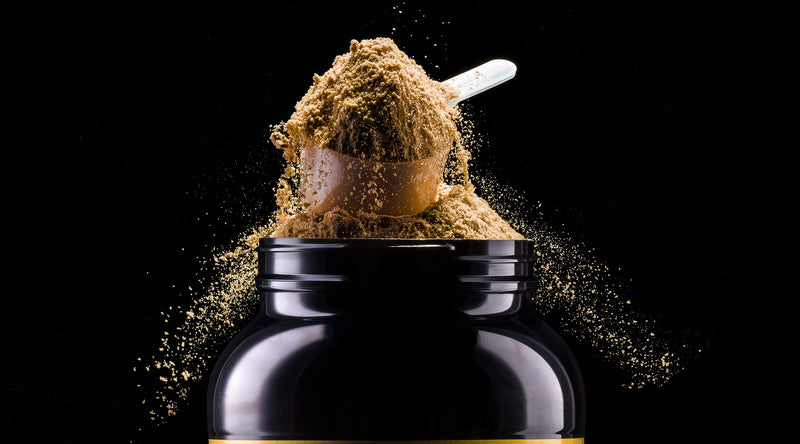Is Protein Powder Good or Bad for Health?
Protein Powders are not just meant for advanced athletes and hardcore bodybuilders.
These days, you can easily find a wide range of protein powders from some of the biggest names in the world of health and wellness at mainstream supermarkets and online stores.
| Quick Summary |
| Protein powder can be good for health, supporting muscle growth and recovery, but excessive intake may lead to digestive issues and kidney strain. |
What Protein Powder?
There is no standard formulation as far as the ingredients of protein powders are concerned.
However, a majority of protein powders that you see at the supermarkets and online stores are made from one or multiple sources of protein.
These protein sources are isolated from a portion of food and thereafter concentrated into a finely powdered and dry form.
Protein Powders may be made from either plant sources (such as quinoa, brown rice, split peas, and soy) or an animal source (dairy-derived casein/whey protein or eggs).
The Nutritional Breakdown of Protein Powder
For a healthy adult, the recommended dietary allowance of protein with a minimal level of physical activity is presently 0.8 grams of protein per kilogram of body weight per day.
However, protein requirements may differ from one individual to another based on their age and activity level.
You need to read the product label and find out the number of proteins that you can access with each serving.
Benefits of Protein Powder
Muscle Growth and Recovery
Protein powder can be an effective tool for promoting muscle growth and recovery, particularly when combined with strength training. It provides a concentrated source of high-quality protein, which is essential for muscle repair and growth.
Weight Management
Consuming protein powder may aid in weight management by increasing feelings of fullness and potentially reducing portion sizes. Some studies have shown that whey protein supplementation can help reduce body weight and total fat mass in overweight or obese individuals.
Blood Sugar Control
Whey protein, a common type of protein powder, has been found to be effective at moderating blood sugar levels. It may increase both insulin levels and sensitivity to its effects, making it potentially beneficial for people with type 2 diabetes.
Convenience
One of the main advantages of protein powder is its convenience. It offers a quick and easy way to increase protein intake, especially for those with busy lifestyles or high protein requirements.
Potential Concerns
Digestive Issues
Some individuals may experience digestive discomfort such as bloating, gas, or constipation when consuming protein powders. This is often due to lactose intolerance (in dairy-based proteins) or sensitivity to certain ingredients.
Quality and Contamination
The quality of protein powders can vary significantly between brands. Some products may contain unwanted ingredients or contaminants. A study by the Clean Label Project found that many protein powders contained heavy metals, BPA, pesticides, or other contaminants.
Overconsumption
While protein is essential for health, consuming excessive amounts through supplements may not provide additional benefits and could potentially lead to unnecessary calorie intake.
Making Informed Choices
When considering protein powder supplementation, keep the following in mind:
Choose high-quality products: Look for protein powders that have undergone third-party testing to ensure safety and quality.
Consider your individual needs: Most people can meet their protein requirements through a balanced diet. Protein powders may be more beneficial for athletes, older adults, or those with increased protein needs.
Pay attention to ingredients: Opt for products with minimal additives and no artificial sweeteners. Be aware of any personal allergies or sensitivities.
Use in moderation: While there’s no established safety limit for protein powder, most research suggests that healthy individuals can safely consume up to 1.5 grams of protein per pound of body weight per day from both food and supplements combined.
Conclusion
Protein Powders have been popular for years as they help promote a nourished body.
Athletes, bodybuilders, and fitness enthusiasts appreciate them for a variety of reasons: improve sports performance, lose weight, gain muscle mass, and overall wellness.
However, it is important for everyone not to be carried away by countless choices ahead of you.
It is highly recommended that you must read the label carefully and study the safety and efficacy profiles of the product ingredients.
Also, you must consume protein shakes within 45-60 minutes of a workout to recover after exercise.
If weight management is your objective, you should consume a steady protein supply at each snack and meal to keep full. Make the right choices, stay safe and healthy!
References:
1. https://pmc.ncbi.nlm.nih.gov/articles/PMC10079511/
2. https://www.medicalnewstoday.com/articles/323093
3. https://pubmed.ncbi.nlm.nih.gov/25169440/
4. https://www.health.harvard.edu/staying-healthy/the-hidden-dangers-of-protein-powders
5. https://www.healthline.com/nutrition/10-health-benefits-of-whey-protein
6. https://www.healthline.com/nutrition/is-powder-bad-for-you


